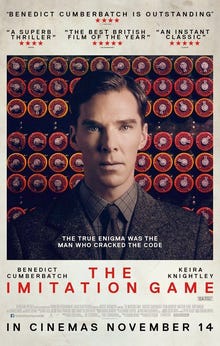Good evening, ILTBTA readers, and happy new year! We’ve got a couple of questions for you:
What is your most memorable childhood event, and how has that impacted you today?
Can you describe yourself using only colors and shapes?
Please explain why time flies like an arrow, but fruit flies like a banana.
What historical event changed you the most, and where were you when it happened?
If you found any of those questions difficult to answer, congratulations, you are robot scum! If you did pass our impromptu “Turing test”, then please: read on!
Previews
What, if anything, did we know about this coming attraction before we watched it?
Ellen: I have a vague recollection of some sort of low-grade controversy about this movie, and I think it may have been that Turing was too gay, or possibly not gay enough? Let’s have a gay old time either way!
Tyler: That controversy rings a bell … I wanna say it was perceived as not gay enough? Regardless, I know the basics of the plot of this (codebreaking during WWII, Alan Turing is a genius, etc.) but little else, so I’m eager to fill in the gaps and see what all the fuss was about.
Plots & Feelings
This one’s pretty self-explanatory.
Short Version (courtesy of IMDb): During World War II, the English mathematical genius Alan Turing tries to crack the German Enigma code with help from fellow mathematicians while attempting to come to terms with his troubled private life.
Long Version (modified from Wikipedia and formatted to fit your screen):
It’s 1951, do you know where your brilliant mathematician and professor Alan Turing is? What’s that, you say he’s in an interrogation room because he’s being cagey about an apparent break-in to his home? Detective Robert Nock is wondering what this man could be hiding, and Alan starts to speak, but insists that Nock pays very close attention.
Tyler: At some point Nock’s supervisor says “What's he doing in Manchester?" and Nock replies with "... Something with machines” which is essentially me trying to explain any aspect of artificial intelligence.
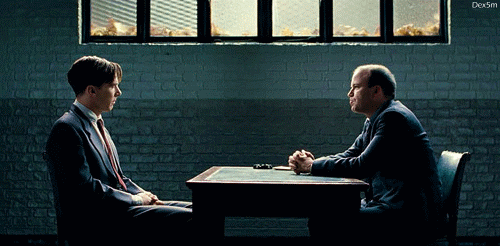
We jump back to 1939, and Alan Turing wants in at Bletchley Park. He believes the team of secret cryptographers there are attempting the most difficult puzzle in the world1: cracking the Nazi’s Enigma machine. Commander Alastair Denniston finds Turing arrogant and off-putting, and he also doesn’t even speak German?! Whatever, he’s hired, along with Hugh Alexander (the leader), John Cairncross, Peter Hilton, and two other guys that don’t matter, sorry! The Enigma machine has 159 quintillion2 possible settings, and the Germans change them at midnight. This means from the first message they intercept at about 6 AM, they have 18 hours to break that day’s code. So, uh, get cracking, boys!
Alan does not get along with his fellow codebreakers, believing that getting a machine to test every setting is a better approach than brute-forcing solutions on the day’s intercepted messages. Aside from disagreeing with the approach, he also says deeply unlikeable things such as, “I don’t like sandwiches,” so this author is also having trouble with him. Thankfully for me, he spends his time making complex diagrams on graph paper that speak to my soul, so I’ll let his tastes slide.
Tyler: Maybe I missed something or this got sandpapered over for movie plot purposes, but surely no one at the time thought that their original approach was the most efficient way of doing things? Maybe it’s done on purpose in the movie to add to the “Turing = enigma” motif because on this hand it wants you to agree with Turing’s obviously-more-efficient approach, but on the other … he doesn’t like sandwiches?!
Ellen: I suppose no one else had thought that a machine could do something like that, like any form of iterative“thinking.” Perhaps to them, he may as well have said they should find a genie to wish that Enigma would simply stop working.
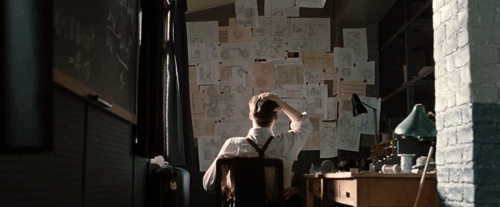
Trying to navigate adulthood (Source)
Alan tries to convince Denniston to fund the machine, a mere £100,0003 investment! Unsuccessful in that attempt, Alan writes to Churchill with the delivery services of MI6 Chief Stewart Menzies and gets himself put in charge. He immediately fires the two bozos I didn’t bother naming earlier. Denniston makes a crack about how popular Alan must have been in school. We get a quick flash to Alan’s classmates teasing him for separating his peas and carrots at lunch and burying him in the floorboards! A boy named Christopher helps him out, and they become friends.
Tyler: I don’t know where else to put this, but the actor who plays young Alan (Alex Lawther) does a phenomenal job in a relatively limited amount of screentime.
Since we’ve lost two deadbeat codebreakers, time to rustle up some more! Alan puts out a difficult crossword in the paper to lure potential crypto enthusiasts4 into the secret mission. One of the hopefuls is Miss Joan Clarke, Cambridge graduate and only person wearing an actual color. She’s selected, but her parents are right old prudes about her working with men. Alan arranges for her to live and work with the women who intercept the German messages, and he smuggles information out to her so she can help in the Enigma effort. Additionally, she helps him realize that people are a lot more willing to help you if they’ve had literally any positive interaction with you. Like, ever. That doesn’t seem to have occurred to him.
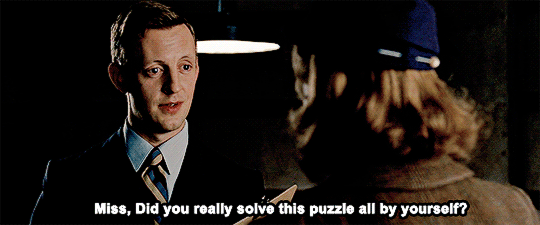
Time passes, and while there are rumors of a Russian spy in the ranks, the more exciting thing is Alan’s machine, which he’s named Christopher, is clunking to life! Unfortunately, it’s too slow to go through every combination before midnight, and Denniston is furious. He demands it be destroyed, but the other breakers threaten to quit if they don’t get more time. They have one more month. In the personal arena, wait, this can’t be right, Joan is leaving?! The prudish parents rear their ugly heads, and Alan is like, “okay, understood, I guess we’ll just get married and solve everything!” During their engagement party at what I assume is Bletchley’s only pub, Alan confides to John that he’s gay. John advises Alan to keep his mouth shut about illegal things.
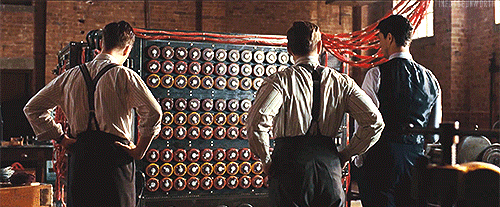
We get a quick cut back to the interrogation room, where Nock is asking what Turing did during the war, because the records are classified. Alan explains his paper “The Imitation Game” and the Turing test. Nock asks if a computer could really ever think. While Alan concedes that most people believe not, he poses a question back: just because something thinks differently than you do, does it mean that it’s not thinking?
Ellen: This toed the line for me of the metaphor between Alan and the machine both “thinking” differently being too heavy-handed, but I think they managed it!
At the pub when Hugh tries to hit on one of the message-intercepting “wrens” (Women’s Royal Naval Service), she jokes about feeling like she’s in a relationship with her German counterpart. He always starts his messages with the same five letters, leading to a revelation: if they know a word that will be in the message, they can program Christopher to start by finding that word! The 6:00 AM message is always a weather briefing and ends with “Heil Hitler.” By using those words to recalibrate the machine, it works! The team celebrates, but as they decode the next day, they come to the horrible realization that if they act on intelligence they couldn’t possibly have otherwise, then the Germans will know they’ve broken the code.
Tyler: The silence of Christopher after it finished the first time was quite satisfying. If anything, I feel like it could've been milked a little longer so the silence lands harder.
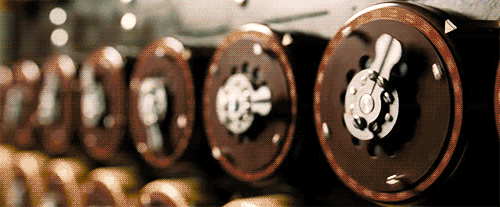
Alan enlists the help of Menzies (from MI6) to hide from everyone, including their own military, that the code has been cracked. The team now shifts to decoding messages and performing a “blood-soaked calculus” to determine which attacks to let happen, and which to prevent. Alan also accidentally discovers that John’s been giving information to the Russians! Under the threat of mutually-assured destruction, he doesn’t say anything until Menzies tells Alan he’s discovered the spy: it’s Joan! Just look at all the classified documents in her room. Alan assures him it’s actually John, and Menzies is like “duh, I know, I let it happen because Churchill is too cautious with intelligence. And oh yeah, stop taking stuff off-site or I’ll arrest Joan for real.”
Ellen: Much to Basil’s chagrin5, until this scene, I did briefly forget that the Russians were on the Allied side.
In an effort to protect her, Alan reveals the truth about his sexuality. She in turn admits that she always suspected, and she doesn’t care. Joan maintains their partnership would be built on mutual respect, intellectual curiosity, and allowing each other to be abnormal in their own ways. Alan’s still too scared for her safety and claims he only used her for her cryptography skills and never cared about her. She’s heartbroken but firm: this is the most important work she’ll ever do in her life, and she’s certainly not cutting it short because of a man.
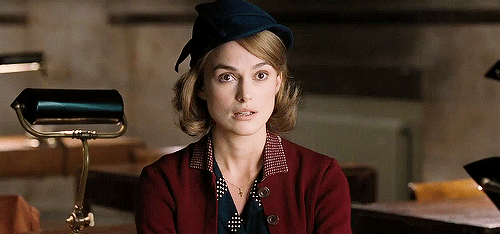
Alan monologues about the end of the war, and we see that the team is instructed to destroy everything, never meet again, and never tell a soul what they’ve done. Better for governments to believe they have unbreakable code machines.
Ellen: Part of the voiceover talks about the moral conundrum of allowing some attacks to move forward and stopping others, because it boils down to deciding who lives and dies. The way this speech is written, Turing’s response is akin to “no, of course I don’t have a God complex, because I’m better.”
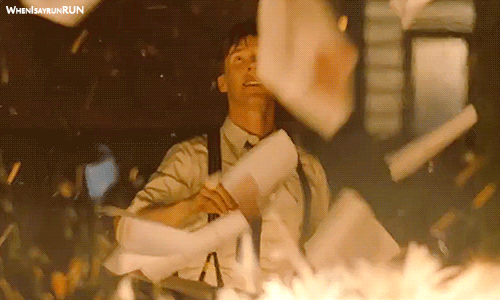
Back in 1952, it turns out Alan’s house was broken into by a man he’d slept with, which is why he was acting so suspicious. He’s convicted of gross indecency and chooses to undergo chemical castration instead of going to prison. Joan comes to visit him after hearing the news, and she’s horrified by the mental and physical deterioration he’s suffering due to the drugs. She assures him that the world is a better place with him in it and that the work he did saved countless lives.
The epilogue shows Turing died by suicide on June 7, 1954, after a year of government-mandated hormonal therapy. In 2013, Queen Elizabeth II granted him a posthumous Royal Pardon. Historians estimate that breaking Enigma shortened the war by over two years, saving over 14 million lives; and Turing's work was an important step towards today's computers.
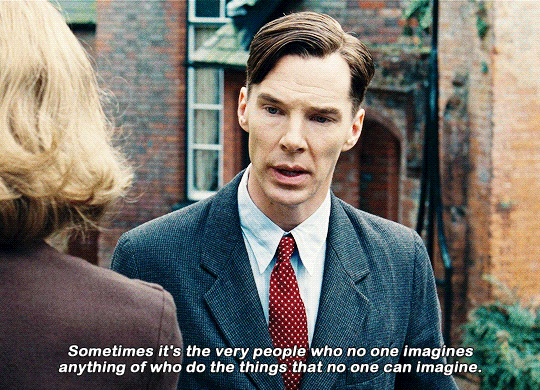
Intermission
Even though ILTBTA is free, please indulge us further and enjoy this quick “advertisement.”
This installment of ILTBTA is brought to you by … Artificial Intelligence!
Tired of doing complex calculations by hand? Frustrated by codes you just can't crack? Artificial intelligence is here to save the day! From breaking Enigma codes to predicting the weather forecast, AI can do it all.
So why wait? Embrace the power of AI and unlock a world of possibilities!
Disclaimer: No humans were harmed in the making of this advertisement. (Except for maybe Alan Turing, but that's a whole other story...)
*Note: This Intermission was written by Gemini. Not as funny as we are, huh?6
Wiki-Wiki-Whaaat?
Love a good Wikipedia rabbit hole in search of some fun facts? Us too.
The Imitation Game’s Wikipedia page has some interesting facts and anecdotes that we recommend you read through, but here are a few of our favorites:
The Imitation Game is very loosely based (more on that below) on the 1983 Alan Turing biography Alan Turing: The Enigma by British mathematician and author Andrew Hodges. It was critically acclaimed at the time of its release, and in 2002 it was chosen by The Guardian as one of the 50 “essential” books.
The film’s title came from Turing’s seminal 1950 paper “Computing Machinery and Intelligence” in which the concept of what is now known as the “Turing test” was introduced.
Tyler: In an attempt to salvage my own brain I opted not to try and summarize anything about Turing’s thoughts on artificial intelligence, but I recommend the two linked Wikipedia pages for anyone who’s eager to go down that rabbit hole.
Ellen: Bye bye, see you when my brain is turned inside out!
Time for another round of everyone’s favorite game: It’s That Guy From That Thing! Here’s where we’ll tell you where you might recognize some of the Imitation Game supporting actors from:
Matthew Goode (who plays codebreaker Hugh Alexander) starred in rom-coms like Chasing Liberty (with Mandy Moore) and Leap Year (with Amy Adams) before moving to more dramatic roles on TV like Finn Polmar on The Good Wife, Henry Talbot on Downton Abbey, and Antony Armstrong-Jones on The Crown.
Goode’s time on Downton Abbey overlapped with that of co-star Allen Leech (who plays Soviet spy and fellow codebreaker John Cairncross): Leech played Tom Branson in the popular British historical drama (and its two movies).
Matthew Beard (who plays the young codebreaker Peter Hilton) had a role in future ILTBTA post An Education and the PBS adaptation of the wonderful mystery novel Magpie Murders. Fun fact about the actual Peter Hilton: he enjoyed working with Turing on chess problems and palindromes and constructed a 51-letter palindrome (“Doc note, I dissent. A fast never prevents a fatness. I diet on cod.”).
Ellen: Making up palindromes for fun is exactly the kind of nerd stuff I’d expect from these guys. I love it.
Rory Kinnear (who plays the detective investigating Turing) has had an extensive and successful career on stage, film, and television. In addition to a theatre career that saw him earn two Olivier Awards (basically the British Tonys), Kinnear has played three different prime ministers: the prime minister in the gnarly first episode of Black Mirror, Winston Churchill in the very fun The Ministry of Ungentlemanly Warfare, and Prime Minister Nicol Trowbridge in “the show that everyone in my life is telling me that I need to watch at the moment” The Diplomat. He also plays M’s Chief of Staff Bill Tanner in the four most recent James Bond films and Tom Bombadil in The Lord of the Rings: The Rings of Power.
While Charles Dance (who plays Bletchley Park head Commander Denniston) also has a long career on stage, film, and television (the Roger Moore Bond film For Your Eyes Only, Alien 3, and unsurprisingly The Crown), you probably recognize him best as Tywin Lannister from Game of Thrones.
The “Historical inaccuracies” section of the film’s Wikipedia page is honestly too extensive to even summarize, but suffice to say that there were more than a few. The blog Information is Beautiful calculated that, even when taking creative license into account, The Imitation Game was only 42.3% accurate compare to real-life events, saying: “... to be fair, shoe-horning the incredible complexity of the Enigma machine and cryptography in general was never going to be easy. But this film just rips the historical record to shreds.”
Ellen: Considering this one was “based on a true story” as opposed to the less accurate “inspired by actual events,” I thought we’d at least do better than 50%!
Despite all of the liberties the film took with the source material (and, ya know, history), screenwriter Graham Moore won the Oscar for Best Adapted Screenplay. Another contributor who won an Oscar that year was Imitation Game composer Alexandre Desplat for Best Original Score, though that was for his work on The Grand Budapest Hotel.
Oscar NomNomNomz
Since we all know a movie is nothing without the food and drink it incorporates.
It’s now time to award the Oscar for Best Snacktor in a Supporting Role.7 And the nomnomnominees are:
An uneaten sandwich during your lunch break as a codebreaker
A plate of peas and carrots that are NOT touching each other
An extra foamy pint at the local pub near Bletchley
And the Oscar goes to … a sandwich on your lunch break! Unfortunately, Benedict Cumberbatch got a little too method and started attacking the sandwich, so we will accept this award on its behalf.
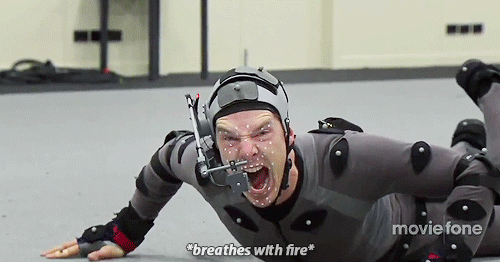
Fill In The Blank
How did we really feel about The Academy nominating this?
Ellen: I’d like to propose to The Academy a marriage built on mutual respect and absolutely free of romance. Much like this fake marriage, I don’t have a lot of feelings about this movie, in all honesty. In the time between watching it and writing this post, it didn’t really cross my mind. I think that every aspect of the making was extremely well, if not unexceptionally, done. It was somehow less than the sum of its parts. The story of Alan Turing and my personal interest in puzzles and building things carried me through more so than any filmmaking or acting decisions. It’s fine!
Tyler: I’d like to buy The Academy a pint of second-rate beer at the Bletchley pub. Immediately after we finished watching this, I got big “jack of all trades, master of none” vibes, by which I mean it did a lot of things pretty well but nothing in particular really stood out as great (i.e., Best Picture worthy). The acting (led by a typically strong performance from Benedict Cumberbatch), the slightly nonlinear timeline, the production design, … they all worked together, but I can’t put my finger on exactly why I didn’t feel like it elevated beyond your typical period biopic of an unconventional hero. (Maybe it was too Oscar-baity?) And I must admit, after my Wiki-Wiki-Whaaat? research, I was a bit turned off by the shockingly high amount of “creative liberty” the film took with the actual historical events. I guess, in my eyes, if a movie is gonna rewrite history that much, I expect to be wowed.
Let The Credits Roll
Thanks for reading! Some quick housekeeping as you exit the theatre:
If you have plots and feelings of your own (on the movie or ILTBTA in general), feel free to comment on the post or simply reply to the email. If you liked reading this: tell your friends! If you hated reading this: tell your friends how much you hated it by forwarding it to them!
ILTBTA is on Letterboxd, the social networking/movie review site for movie fans. Follow us there to read our Spreadsheet comments of our ILTBTA movies, plus our ratings of other movies we watch!
If you’d like to start a wild Best Picture journey of your own, feel free to download a copy of The Spreadsheet. Bonus: checking off the boxes is oddly satisfying.
Post-Credits Scene
Get a sneak peek at the next ILTBTA installment.
For our next and final film of jAInuary, we’ll be time traveling from World War II-era Britain to Los Angeles of the near future to tackle the 2013 sci-fi rom-com-dram Her. Written, directed, and co-produced by filmmaker Spike Jonze, Her follows a man (played by Joaquin Phoenix) who develops a relationship with an AI operating system (voiced by Scarlett Johansson). Trust us: it’s just as strange (but much more heartfelt and thought-provoking) than it sounds. Teach AI systems of the future by renting Her from your streaming service of choice (or, if you’re us, your local library!).
Until then, go touch some grass!

Sounds like my ex-wife!
Fun fact: if you Google this number, most of the top search results are about Enigma or The Imitation Game!
That’s about £5.5 million today! As a secondary fun fact, the CPI Inflation Calculator I usually use goes back to 1913. The Bank of England tool I used here goes back to 1209!
Not that kind.
We have a bit that Basil is a secret agent sent from the Russian space agency to spy on us NASA employees. We’re fully aware of how weird this is.
Don’t answer that.
Results tabulated and certified by the accountants at Ernst & Yum™.





